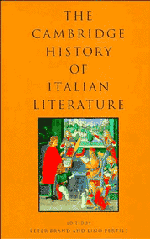Book contents
- Frontmatter
- Origins and Duecento
- The Trecento
- The Quattrocento
- The Cinquecento
- The Seicento: Poetry, Philosophy and Science
- Narrative prose and theatre
- The Settecento
- The Age of Romanticism (1800–1870)
- The Literature of United Italy (1870–1910)
- The Rise and Fall of Fascism (1910–45)
- The Aftermath of the Second World War (1945–56)
- 39 After the Liberation
- 40 Neo-realism
- 41 History and the poets
- Contemporary Italy (since 1956)
- Bibliography
39 - After the Liberation
from The Aftermath of the Second World War (1945–56)
Published online by Cambridge University Press: 28 March 2008
- Frontmatter
- Origins and Duecento
- The Trecento
- The Quattrocento
- The Cinquecento
- The Seicento: Poetry, Philosophy and Science
- Narrative prose and theatre
- The Settecento
- The Age of Romanticism (1800–1870)
- The Literature of United Italy (1870–1910)
- The Rise and Fall of Fascism (1910–45)
- The Aftermath of the Second World War (1945–56)
- 39 After the Liberation
- 40 Neo-realism
- 41 History and the poets
- Contemporary Italy (since 1956)
- Bibliography
Summary
The end of political censorship in post-Liberation Italy enabled Italians to take a good look at themselves, to explore Italy stripped of Fascist rhetoric and come to terms with the barbarity of the war and the concentration camps in a supposedly civilised Europe, and to seek political renewal for the Italy that was taking shape out of the ruins of war.
The coalition of anti-Fascist parties soon started falling apart after the war, and the 1948 elections saw a Christian Democrat majority in government and other parties excluded from power. Church influence waxed strong, not only with the threat of excommunication wielded as an electoral stick, especially against the strong Communist Party, but also with the mobilisation of mass piety during the Holy Year of 1950 followed by the Marian Year of 1951. The Republican constitution of 1947, many of whose most important democratising provisions were for decades to remain a dead letter, had marked the high point of radical change. Redistribution of land, however, and abolition of the iniquitous share-cropping system of mezzadria, led to the transformation of the peasantry into modern small farmers, and to the disappearance of the peasant novel by about the mid-1950s, after some of its last and finest instances in the work of Jovine, Silone, Pavese and Fenoglio. Likewise, the mechanisation of agriculture eventually made it impossible for poetry to return to the exquisite nature lyricism of much hermetic poetry from the 1930s to the 1950s.
- Type
- Chapter
- Information
- The Cambridge History of Italian Literature , pp. 531 - 534Publisher: Cambridge University PressPrint publication year: 1997



